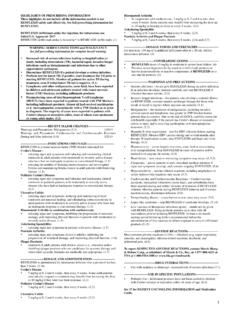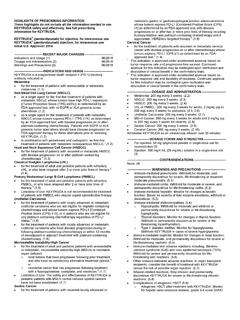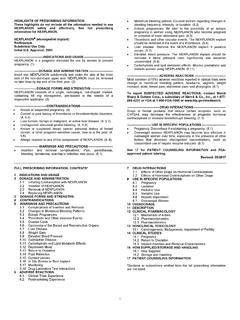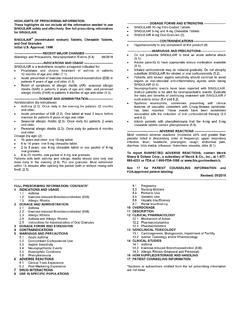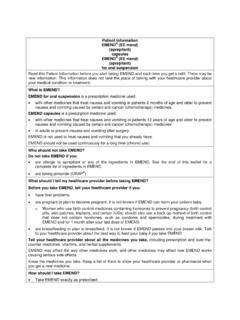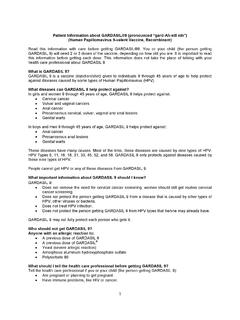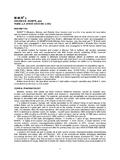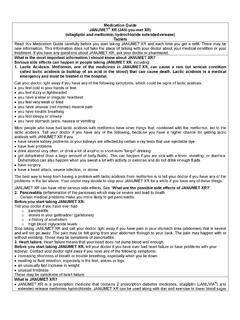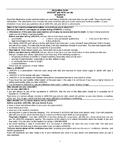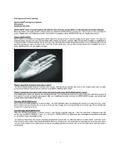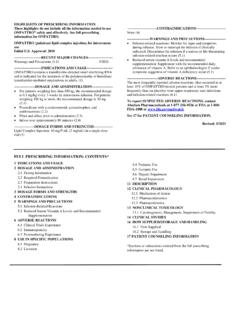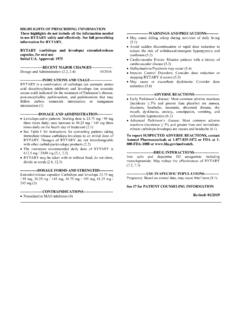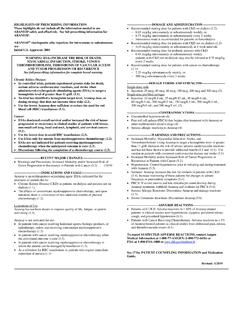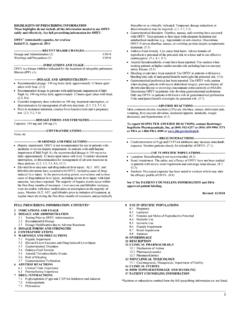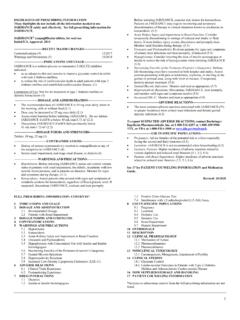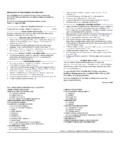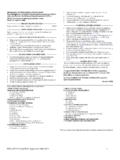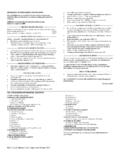Transcription of HIGHLIGHTS OF PRESCRIBING INFORMATION These …
1 HIGHLIGHTS OF PRESCRIBING INFORMATIONT hese HIGHLIGHTS do not include all the INFORMATION needed to use JANUVIA safely and effectively. See full PRESCRIBING INFORMATION for JANUVIA. JANUVIA (sitagliptin) TabletsInitial Approval: 2006---------------------------RECENT MAJORCHANGES---------------------------D osage and AdministrationRecommendations for Use in RenalImpairment ( )02/2018 Concomitant Use with an Insulin Secretagogue( , Sulfonylurea) or with Insulin ( )Removal 02/2018 Warnings and PrecautionsHeart Failure ( )08/2017 Assessment of Renal Function ( )02/2018 Macrovascular Outcomes ( )02/2018----------------------------INDI CATIONS AND USAGE----------------------------JANUVIA is a dipeptidyl peptidase-4 (DPP-4) inhibitor indicated as an adjunct to diet and exercise to improve glycemic control in adults with type 2 diabetes mellitus.
2 ( )Important Limitations of Use: JANUVIA should not be used in patients with type 1 diabetes or for the treatment of diabetic ketoacidosis. ( ) JANUVIA has not been studied in patients with a history of pancreatitis.( , )-----------------------DOSAGE AND ADMINISTRATION------------------------Th e recommended dose of JANUVIA is 100 mg once daily. JANUVIA can be taken with or without food. ( )Dosage adjustment is recommended for patients with eGFR less than 45 mL/ ( )Dosage Adjustment in Patients with Renal Impairment( )eGFRgreater than or equal to 30 mL/ less than 45 mL/ m2eGFR less than 30 mL/ m2(including patients with end stage renal disease [ESRD] on dialysis)50 mg once daily25 mg once daily---------------------DOSAGE FORMS AND STRENGTHS---------------------Tablets:10 0 mg, 50 mg, and 25mg (3)-------------------------------CONTRA INDICATIONS----------------------------- --History of a serioushypersensitivity reaction to sitagliptin, such as anaphylaxis or angioedema ( , )------------------------WARNINGS AND PRECAUTIONS------------------------ There have been postmarketing reports of acute pancreatitis, including fatal and non-fatal hemorrhagic or necrotizing pancreatitis.
3 If pancreatitis is suspected, promptlydiscontinue JANUVIA.( ) Heart failure has been observed with two other members of the DPP-4 inhibitor risks and benefits of JANUVIA in patients who have known risk factors for heart failure. Monitor patients for signs and symptoms. ( ) There have been postmarketing reports of acute renal failure, sometimes requiring dialysis. Dosage adjustment is recommended in patients with moderate or severe renal impairment and in patients with ESRD. Assessment of renal function is recommended prior to initiating JANUVIA and periodically thereafter. ( , , ) There is an increased risk of hypoglycemia when JANUVIA is added to an insulin secretagogue ( , sulfonylurea) or insulin therapy. Consider lowering the dose of the sulfonylurea or insulin to reduce the risk of hypoglycemia. ( , ) There have been postmarketing reports of serious allergic and hypersensitivity reactions in patients treated with JANUVIA such asanaphylaxis, angioedema, and exfoliative skin conditions including Stevens-Johnson syndrome.
4 In such cases, promptly stop JANUVIA, assess for other potential causes, institute appropriate monitoring and treatment, and initiatealternative treatment for diabetes. ( , ) Severe and disabling arthralgiahas been reported inpatients taking DPP-4 inhibitors. Consider as a possible cause for severe joint pain and discontinuedrug if appropriate. ( ) There have been postmarketing reports of bullous pemphigoid requiring hospitalization in patients taking DPP-4 inhibitors. Tell patients to report development of blisters or erosions. If bullous pemphigoid is suspected, discontinue JANUVIA. ( ) There have been no clinical studies establishing conclusive evidence of macrovascular risk reduction with JANUVIA.( )------------------------------ADVERSE REACTIONS------------------------------A dverse reactions reported in 5% of patients treated with JANUVIA and more commonly than in patients treated with placebo are: upper respiratory tract infection, nasopharyngitis and headache.
5 In the add-on to sulfonylurea and add-on to insulin studies, hypoglycemia was also more commonly reported in patients treated with JANUVIA compared to placebo. ( ) To report SUSPECTED ADVERSE REACTIONS, contact Merck Sharp & Dohme Corp., a subsidiary of Merck & Co., Inc., at 1-877-888-4231 or FDA at 1-800-FDA-1088 or IN SPECIFIC POPULATIONS----------------------- Safety and effectiveness of JANUVIA in children under 18 years have notbeen established. ( ) There are no adequate and well-controlled studies in pregnant women. To report drug exposure during pregnancy call 1-800-986-8999. ( )See 17 for PATIENT COUNSELING INFORMATION and Medication : 02/2018 FULL PRESCRIBING INFORMATION : CONTENTS*1 INDICATIONS AND Monotherapy and Combination Important Limitations of Use2 DOSAGE AND Recommended Recommendations for Use in Renal Impairment3 DOSAGE FORMS AND STRENGTHS4 CONTRAINDICATIONS5 WARNINGS AND Heart Assessment of Renal Use with Medications Known to Cause Hypersensitivity Severe and Disabling Bullous Macrovascular Outcomes6 ADVERSE Clinical Trials Postmarketing Experience7 DRUG Insulin Secretagogues or Insulin8 USE IN SPECIFIC Pediatric Geriatric Renal Impairment10 OVERDOSAGE11 DESCRIPTION212 CLINICAL Mechanism of Pharmacokinetics13 NONCLINICAL Carcinogenesis, Mutagenesis.
6 Impairment of Fertility14 CLINICAL Combination Therapy16 HOW SUPPLIED/STORAGE AND HANDLING17 PATIENT COUNSELING Laboratory Tests*Sections or subsections omitted from the full PRESCRIBING INFORMATION are not INFORMATION1 INDICATIONS AND Combination TherapyJANUVIA is indicated as an adjunct to diet and exercise to improve glycemic control in adults with type 2 diabetes mellitus. [See Clinical Studies (14).] Important Limitations of UseJANUVIA should not be used in patients with type 1 diabetes or for the treatment of diabetic ketoacidosis, as it would not be effective in These has not been studied in patients with a history of pancreatitis. It is unknown whether patients with a history of pancreatitis are at increased risk for the development of pancreatitis while using JANUVIA.[See Warnings and Precautions ( ).]
7 ]2 DOSAGE AND DosingThe recommended dose of JANUVIA is 100 mg once daily. JANUVIA can be taken with or without for Use in Renal ImpairmentFor patients with an estimated glomerular filtration rate [eGFR] greater than or equal to 45 mL/ m2to less than 90 mL/ , no dosage adjustment for JANUVIA is patients with moderate renal impairment(eGFRgreater than or equal to 30 mL/ less than 45mL/ m2), the dose of JANUVIAis 50 mg once patients with severe renal impairment(eGFR less than 30 mL/ ) or with end-stage renal disease (ESRD) requiring hemodialysis or peritoneal dialysis, the dose of JANUVIA is 25 mg once daily. JANUVIA may be administered without regard to the timing of is a need for dosage adjustment based upon renal function, assessment of renal function is recommended prior to initiation of JANUVIA and periodically have been postmarketing reports of worsening renal function in patients with renal impairment, some of whom were prescribed inappropriate doses of FORMS AND STRENGTHS 100 mg tablets are beige, round, film-coated tablets with 277 on one side.
8 50 mg tablets are light beige, round, film-coated tablets with 112 on one side. 25 mg tablets are pink, round, film-coated tablets with 221 on one of a serioushypersensitivity reaction to sitagliptin, such asanaphylaxis or angioedema. [See Warnings and Precautions ( ); Adverse Reactions ( ).]5 WARNINGS AND have been postmarketing reports of acute pancreatitis, including fatal and non-fatal hemorrhagic or necrotizing pancreatitis, in patients taking JANUVIA. After initiation of JANUVIA, patients should be observed carefully for signs and symptoms of pancreatitis. If pancreatitis is suspected, JANUVIA should promptly be discontinued and appropriate management should be initiated. It is unknown 3whether patients with a history of pancreatitis are at increased risk for the development of pancreatitis while using FailureAn association between dipeptidyl peptidase-4 (DPP-4) inhibitor treatment and heart failure has been observed in cardiovascular outcomes trials for two other members of the DPP-4 inhibitor class.
9 These trials evaluated patients with type 2 diabetes mellitus and atherosclerotic cardiovascular the risks and benefits of JANUVIA prior to initiating treatment in patients at risk for heart failure, such as those with a prior history of heart failure and a history of renal impairment, and observe These patients for signs and symptoms of heart failure during therapy. Advise patients of the characteristic symptoms of heart failure and to immediately report such symptoms. If heart failure develops, evaluate and manage according to current standards of care and consider discontinuation of JANUVIA. Assessment of Renal FunctionAssessment of renal function is recommended prior to initiating JANUVIA and periodically thereafter. A dosage adjustment is recommended in patients with moderate or severe renal impairment and in patients with ESRD requiring hemodialysis or peritoneal dialysis.
10 [See Dosage and Administration ( ); Clinical Pharmacology ( ).]Caution should be used to ensure that the correct dose of JANUVIA is prescribed for patients with moderate (eGFR 30 mL/ <45 mL/ ) or severe (eGFR <30mL/ ) renal have been postmarketing reports of worsening renal function, including acute renal failure, sometimes requiring dialysis. A subset of These reports involvedpatients with renal impairment, some of whom were prescribed inappropriate doses of sitagliptin. A return to baseline levels of renal impairment has been observedwith supportive treatment and discontinuation of potentially causative can be given to cautiously reinitiating JANUVIA if another etiology is deemed likely to have precipitatedthe acute worsening of renal has not been found to be nephrotoxic in preclinical studies at clinically relevant doses, or in clinical Use with Medications Known to Cause Hypoglycemia When JANUVIA was used in combination with a sulfonylurea or with insulin, medications known to cause hypoglycemia, the incidence of hypoglycemia was increased over that of placeboused in combination with a sulfonylurea or with insulin.
